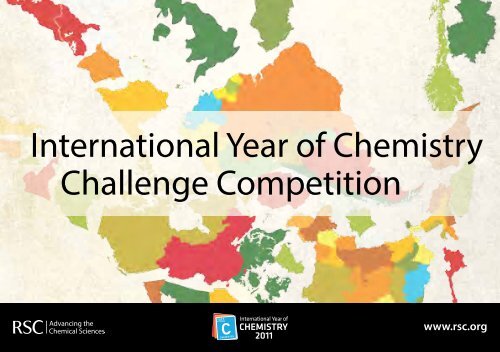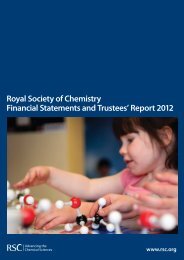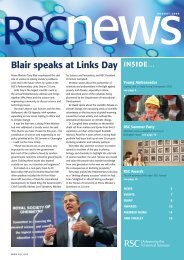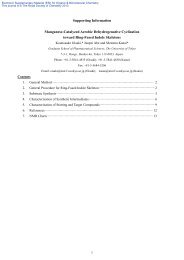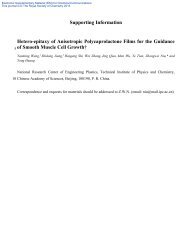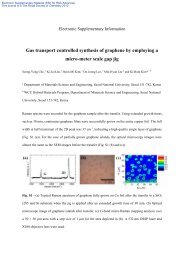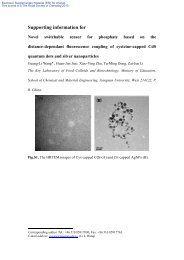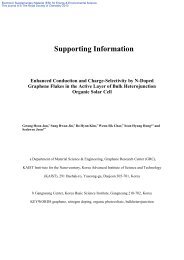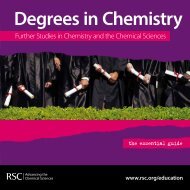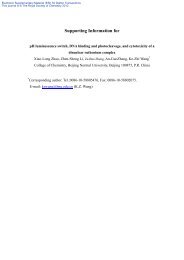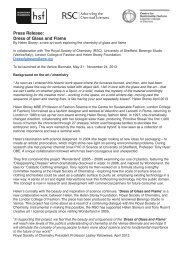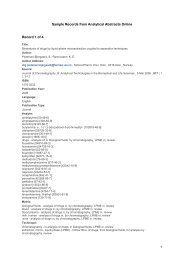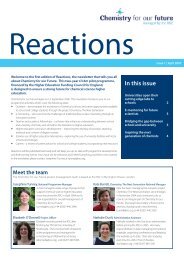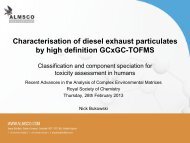IYC Challenge Booklet - Royal Society of Chemistry
IYC Challenge Booklet - Royal Society of Chemistry
IYC Challenge Booklet - Royal Society of Chemistry
Create successful ePaper yourself
Turn your PDF publications into a flip-book with our unique Google optimized e-Paper software.
International Year <strong>of</strong> <strong>Chemistry</strong><br />
<strong>Challenge</strong> Competition<br />
www.rsc.org
The United Nations declared 2011 as the ‘International Year <strong>of</strong> <strong>Chemistry</strong>’<br />
(<strong>IYC</strong>), and the <strong>Royal</strong> <strong>Society</strong> <strong>of</strong> <strong>Chemistry</strong> (RSC) and its members used this<br />
opportunity to promote the global importance <strong>of</strong> chemistry.<br />
When the year <strong>of</strong> extraordinary activities came to end, Immediate-Past-<br />
President David Phillips challenged RSC members to use this momentum<br />
and to create a lasting legacy to the <strong>IYC</strong> by using £1,000 grants to promote<br />
chemistry to the widest possible audience. The most original project with<br />
the highest impact was to receive continuation funds <strong>of</strong> £10,000.<br />
By the end <strong>of</strong> 2012, more than 80 member groups took part in the<br />
competition, hosting numerous creative and impactful activities and<br />
events that inspired teachers, students, scientists and the public alike.<br />
Choosing a single winner among so many fantastic activities<br />
proved almost impossible. So RSC President Lesley Yellowlees and<br />
Chief Executive Robert Parker awarded three £10,000 prizes.<br />
We’ve captured these three projects as well some <strong>of</strong> the other<br />
remarkable activities that our members organised as part <strong>of</strong> the <strong>IYC</strong><br />
challenge competition throughout 2012 in this special publication.<br />
Thank you and congratulations to everyone who took part – together we<br />
have succeeded in championing the chemical sciences far beyond the <strong>IYC</strong>.<br />
For more information on all projects, visit http://rsc.li/iyc-2012
Making the most <strong>of</strong> the Olympic fever gripping the UK in 2012, the Analytical Division South East Region<br />
sponsored Chemical Pentathlon, an outreach activity for year 9 students that was developed at the University <strong>of</strong> Reading.<br />
Thirteen teams from eleven local schools had the chance to compete in five fun chemistry-related events, including<br />
making a gold medal out <strong>of</strong> a copper coin by dipping it in sodium zincate solution and<br />
timing an iodine clock reaction to the 800m world record.<br />
250 school children were given the chance to visit the crazy changes show.<br />
The Liverpool Local Section worked with the Catalyst Science Discovery Centre in Widnes to put<br />
on an interactive show that explained the states <strong>of</strong> matter.<br />
As part <strong>of</strong> the show, the participants also learnt how to make<br />
foam, slime and oversized candles.
The Environmental <strong>Chemistry</strong> Group supported researchers from<br />
Leicester University to develop outreach materials that<br />
bring atmospheric chemistry to life<br />
in schools and at local science exhibits. With standalone information and<br />
instructions, the ‘Atmospheric pollution monitoring kit’ can be used<br />
by teachers and students to make meterological measurements,<br />
assess water quality and much more.<br />
Approximately 30 teams from various schools<br />
showcased models, presentations and charts on ways to<br />
treat and conserve water<br />
at the Deccan Local Section’s science fair on<br />
water chemistry and management.
Supported by the British Carbon Group,<br />
NanoteC is one <strong>of</strong> Europe’s longest running<br />
carbon nanoscience conferences.<br />
It brings together anyone with an interest<br />
in the world <strong>of</strong> carbon fullerenes,<br />
nanotubes, graphene and more, in a<br />
friendly, informal setting<br />
since 1998, and its success continued in 2012.<br />
Visual demonstrations, colourful experiments and<br />
a few explosions<br />
created enthusiasm for chemistry among 1,700<br />
primary school children in the Bristol area.<br />
The Bristol and District Local Section awarded<br />
their £1,000 grant to Bristol ChemLabS<br />
to inspire children<br />
with their ‘Gases in the air’<br />
assembly.
The Central Yorkshire Local Section challenged local pupils to find out more<br />
about scientists – both past and present – from the region and to use their research to design a<br />
chemistry-themed Christmas card. Revealing what inspired her choice,<br />
competition winner Natasha Pickard said: “John Ernest Walker interests me because he is unknown to<br />
most people and in the science world he’s seen as a superstar.”<br />
The other winner, Alexandra Shipley, explained her choice by saying: “I have chosen to feature<br />
Joseph Priestley because <strong>of</strong> his involvement with two <strong>of</strong> the most essential things in my life…<br />
oxygen […and…] the rubber eraser.<br />
To bring the discoveries together with Christmas I have taken a copy <strong>of</strong> his image to create a<br />
Santa rubbing out the H’s from ‘Ho Ho Ho!’ to leave ‘O O O!’”<br />
The festival <strong>of</strong> chemistry, organised<br />
by the Chennai Local Section, consisted <strong>of</strong> a series <strong>of</strong><br />
events that highlighted the importance <strong>of</strong> chemistry<br />
in everyday life. Higher secondary school chemistry<br />
students had the chance to learn more about<br />
career opportunities<br />
and to take part in chemistry<br />
demonstrations and quizzes.
The University <strong>of</strong> Surrey Perovskite project combines solid state chemistry with<br />
crafts to generate a giant knit and crochet model <strong>of</strong> the<br />
common mineral perovskite. The Solid State <strong>Chemistry</strong> Group supported this<br />
project to bring together scientists and non-scientists to<br />
share experiences and knowledge<br />
to create a permanent model that is set for completion<br />
in September 2013.<br />
Seven local schools took part in the annual<br />
Top <strong>of</strong> the Bench competition heats<br />
run by the Mid-Wales Local Section.<br />
Additionally, they were challenged to take part in a<br />
crystal competition, which involved<br />
preparing a set <strong>of</strong> crystals and a presentation<br />
to be judged on the day.<br />
As part <strong>of</strong> a joint initiative with the RSC Pan Africa <strong>Chemistry</strong> Network (PACN),<br />
Crawford Scientific Ltd. and Thermo Scientific Ltd., the Separation Science Group provided<br />
complete kit boxes for demonstrating simple column chromatography<br />
for school children in Africa as well as a web-based resource for teachers.
Migrant school children in Beijing received a rare chance to study science thanks<br />
to the Beijing Local Section. Together with the Migrant School’s Foundation (MCF), the Local Section set up a practical chemistry<br />
programme – with demonstrations and hands-on experiments<br />
for final-year primary students – that can be taken into migrant schools.<br />
The project has already made a great impact and was announced as one <strong>of</strong><br />
the <strong>IYC</strong> challenge competition winners at the General Assembly 2012.
The Speciality Chemicals Sector created the third project to be awarded<br />
an additional £10,000 funding.<br />
Their project, Zinc – Hunting for minerals, enables schools to visit and<br />
explore a line <strong>of</strong> mineralisation in limestone running through North Wales.<br />
Through a hand-on ‘zinc hunt’, children can find out more about<br />
minerals, metals and chemistry,<br />
and a booklet provides background information on things such as the<br />
history <strong>of</strong> North Wales lead-zinc mining,<br />
the chemistry <strong>of</strong> zinc and its uses.<br />
The Historical Group and Chemical Information and Computer Applications Group<br />
joined forces to fund a project that could enthuse and excite<br />
and have long-term impact. Together with the Catalyst Science Discovery Centre in<br />
Widnes they developed ORIGINS, one <strong>of</strong> the <strong>IYC</strong> challenge competition’s winning projects.<br />
New interactive computer simulations allow visitors<br />
to explore the birth <strong>of</strong> the lighter elements in stars, and<br />
workshops for schools<br />
during the week and for families at the weekends allow children<br />
and adults to learn more about<br />
atoms and elements.
The Biological and Medicinal <strong>Chemistry</strong> Sector (BMCS) organised<br />
the first RSC-BMCS Agriscience Chemical Biology postgraduate symposium.<br />
Held at Imperial College London, the symposium provided postgraduate and postdoctoral researchers with an<br />
opportunity to learn more about the exciting research going on in this field and to network.<br />
The RSC representative in Qatar<br />
organised a competition to<br />
promote green chemistry in five local schools.<br />
Following seminars and presentations on green chemistry, the students<br />
were able to test their new knowledge in a quiz.<br />
Wishing to set up a project with lasting benefits<br />
for the chemical sciences,<br />
the Birmingham and West Midlands Local Section established a<br />
chemistry outreach centre at Winterbourne House and<br />
Garden near the University <strong>of</strong> Birmingham. This includes a basic laboratory<br />
that can be used for public workshops and demonstrations focused on food<br />
and gardening and a chemistry trail that shows<br />
that chemistry surrounds us.
The West India Local Section held a very successful two-day symposium<br />
in Nagpur that attracted eminent speakers and guests.<br />
Students had the chance to showcase their research at<br />
poster sessions and delegates could<br />
find out more about the RSC<br />
from event organiser Dr Gopalan.<br />
Sri Lanka suffered from a civil war for over 25 years, which severely affected its population, environment and economy.<br />
In addition, the tsunami resulting from the 2004 Indian Ocean earthquake caused destruction in the North and East <strong>of</strong><br />
the country. This is why the Sri Lanka Local Section decided to use their <strong>IYC</strong> grant to help rebuild the education sector<br />
and to popularise chemistry as a core science at secondary school level.
All <strong>IYC</strong> challenge competition activities<br />
Analytical Division East Anglia Region<br />
Analytical Division North East Region<br />
Analytical Division North West Region<br />
Analytical Division Northern Ireland Region<br />
Analytical Division Scotland Region<br />
Analytical Division South East Region<br />
Analytical Division Western Region<br />
Applied Catalysis Group<br />
Applied Materials <strong>Chemistry</strong> Group<br />
Atomic Spectroscopy Group<br />
Automation and Analytical Management Group (AAMG)<br />
Beijing Local Section<br />
Biological and Medicinal <strong>Chemistry</strong> Sector (BMCS)<br />
Biotechnology Group<br />
Birmingham and West Midlands Local Section<br />
Bristol and District Local Section<br />
British Carbon Group<br />
Carbohydrate Group<br />
Central Yorkshire Local Section<br />
Chemical Education Research Group<br />
Chemical Information and Computer Applications<br />
Group<br />
Chemical Nanoscience and Nanotechnology Group<br />
Chennai Local Section<br />
Deccan Local Section<br />
Downland Local Section<br />
East Anglia Local Section<br />
<strong>Chemistry</strong> Masterclass: Synthesis and spectroscopy<br />
TLC for GCSE <strong>Chemistry</strong>: Comparing fresh versus frozen spinach<br />
Streamwatch project: These kits have been developed to allow anyone to carry out simple scientific tests on bodies <strong>of</strong> water<br />
Purchasing 12 conductance meters and digital thermometers to extend the events available to local schools<br />
Faces <strong>of</strong> <strong>Chemistry</strong> video (in collaboration with the RSC Education Team)<br />
Chemical Pentathlon at the University <strong>of</strong> Reading<br />
Mid-Cornwall Schools <strong>Chemistry</strong> Conferences<br />
Careers Day: A celebration <strong>of</strong> catalysis and training day: Applied industrial catalysis<br />
Sponsoring teacher training for primary school children: Advances and frontiers in chemical spectroscopy with neutrons<br />
A series <strong>of</strong> short video tutorials covering aspects <strong>of</strong> atomic spectroscopy<br />
Nanosensor technologies for monitoring: Materials and methods<br />
A rare chance to study science: Practical chemistry for migrant children<br />
1st RSC-BMCS Agriscience Chemical Biology postgraduate symposium<br />
Chromatography demonstrations for primary schools<br />
Outreach laboratory project: Winterbourne Gardens<br />
Primary schools’ mini tour <strong>of</strong> Bristol ChemLabS<br />
NanoteC conference<br />
<strong>Royal</strong> <strong>Society</strong> Summer Science Exhibition 2013: The complex life <strong>of</strong> sugars<br />
Schools challenge: Yorkshire chemists; a challenge sent to all schools in West Yorkshire<br />
Describing Practice in <strong>Chemistry</strong> Teaching (DePiCT): Researching excellent paedagogic practice in chemistry<br />
ORIGINS; a permanent addition to the Catalyst programme, an exhibition looking at the birth <strong>of</strong> the elements<br />
Postgraduate symposium on nanotechnology<br />
Festival <strong>of</strong> chemistry for local senior secondary school<br />
Science fair on water chemistry and management for school children and ladies’ evening on science and health<br />
Charterhouse <strong>IYC</strong> day, Sussex chemistry conference and lecture on periodic table<br />
<strong>Chemistry</strong> with cabbage
East India Local Section A series <strong>of</strong> lectures at Jadavpur University and Sitananda College and a lecture for school students in the Calcutta area<br />
East Midlands Local Section Younger Members symposium 2012<br />
East Midlands Local Section Younger Members Younger Members symposium 2012<br />
Education Division South East Region <strong>Chemistry</strong> photography competition<br />
Electrochemistry Group Two competitions for pupils: Draw a cartoon to illustrate an electrochemistry and design a power source using household items<br />
Energy Sector Early-career energy symposium<br />
Environmental <strong>Chemistry</strong> Group Atmospheric field measurement outreach materials<br />
Essex Local Section Primary school science practical DVD for Essex primary schools<br />
Formulation Science & Technology Group Formulation resource pack: Making formulation fun!<br />
Historical <strong>Chemistry</strong> Group ORIGINS; a permanent addition to the Catalyst programme, an exhibition looking at the birth <strong>of</strong> the chemical elements<br />
Huddersfield Local Section Photography competition and transport for schools to the christmas lecture in Central Yorkshire<br />
Industrial Physical <strong>Chemistry</strong> Group <strong>Chemistry</strong> for tomorrow’s world symposium<br />
Inorganic Biochemistry Group Supporting young investigators and keynote speakers at two events<br />
International Network <strong>of</strong> Environmental Forensics Environmental CSI<br />
Lancaster and District Local Section RSC chemistry enhancement day<br />
Law Group How chemistry assists law enforcement<br />
Liverpool Local Section Flash, bangs and wallops: demonstration for primary school children<br />
Macrocyclic and Supramolecular <strong>Chemistry</strong> Group MASC2012: Annual Interest Group meeting<br />
Management Group Providing an FT-IR spectrometer for the outreach laboratory in the School <strong>of</strong> <strong>Chemistry</strong>, Newcastle University<br />
Marketing Group Providing an FT-IR spectrometer for the outreach laboratory in the School <strong>of</strong> <strong>Chemistry</strong>, Newcastle University<br />
Mid-Anglia Local Section Big Bang Eastern <strong>Chemistry</strong> Prize at Duxford & Cambridge Hands On Science (CHaOS) events<br />
Mid-Scotland Local Section Primary school outreach: members who are retired teachers visit local primary schools to run practical chemistry sessions<br />
Mid-Southern Counties Local Section <strong>Chemistry</strong> and industry evening event<br />
Mid-Wales Local Section Top <strong>of</strong> the Bench competition<br />
Molecular Spectroscopy Group The Island Chemist project: chemical sample analysis promoting synthesis and analytical science to pupils and teachers<br />
Mossbauer Spectroscopy Group Travel grants for international conferences to represent the UK research community<br />
Newcastle & North East Coast Local Section Regional roadshow<br />
NMR Discussion Group Opportunities for early-career researchers: Symposium<br />
North India Local Section Green chemistry networking in India
North Staffordshire Local Section<br />
North Wales Local Section<br />
Northern Ireland Local Section<br />
Nucleic Acids Group<br />
Particle Characterisation Group<br />
Peninsula Local Section<br />
Protein & Peptide Science Group<br />
Qatar Representative<br />
Republic <strong>of</strong> Ireland Local Section<br />
Separation Science Group<br />
Shanghai Local Section<br />
Solid State <strong>Chemistry</strong> Group<br />
Solid Surfaces Group<br />
South Africa (North) Local Section<br />
South Wales West Local Section<br />
Southumbria Local Section<br />
Speciality Chemicals Sector<br />
<strong>Chemistry</strong> and green science teacher network<br />
Forensics and fireworks: a schools event and a public event<br />
All Ireland symposium: celebrating chemistry and fostering new links and collaborations across the region<br />
Riboregulation conference, Shanghai<br />
Chemical origami: build your own crystal<br />
<strong>Chemistry</strong>-based outreach activities for local schools: Spectroscopy in a suitcase<br />
PPSG early-career researcher meeting<br />
Popularising green chemistry<br />
All Ireland symposium: celebrating chemistry and fostering new links and collaborations across the region<br />
Experimental chromatography for Africa: kits for ten schools<br />
Two chemistry presentation competitions, one for schools and one for undergraduates<br />
The Perovskite project<br />
The impact <strong>of</strong> surface science<br />
Training district education <strong>of</strong>ficials in the new science curriculum<br />
<strong>IYC</strong> baseball caps for contestants in the Local Section <strong>Chemistry</strong> Olympiad<br />
SciFest 2012: Astrosphere<br />
Spectroscopy and Dynamics Group Chasing nimbus and gold dust 3<br />
Sri Lanka Local Section<br />
Surface Reactivity & Catalysis (SURCAT) Group<br />
Tayside Local Section<br />
Teesside Local Section<br />
Teesside Local Section Younger Members<br />
Theoretical <strong>Chemistry</strong> Group<br />
Thermal Methods Group<br />
Toxicology Group<br />
West India Local Section<br />
Zinc – Hunting for minerals: a chemistry project for primary schools<br />
Facilitation and popularisation <strong>of</strong> chemistry in the war- and tsunami-affected districts in Sri Lanka<br />
Postgraduate meeting<br />
Continuing the <strong>Chemistry</strong> Map <strong>of</strong> Scotland project<br />
Training teachers in giving demonstrations<br />
<strong>Chemistry</strong> calendar composed <strong>of</strong> photographs and images by Local Section members<br />
Travel grants for 2013 meeting<br />
Sponsorship <strong>of</strong> a summer project for an undergraduate student in UCL School <strong>of</strong> Pharmacy, supplemented by the<br />
group’s funds<br />
Faces <strong>of</strong> <strong>Chemistry</strong> video (in collaboration with the RSC Education Team)<br />
Nagpur symposium; hosted between two educational institutions over two days with 16 eminent speakers
There is more<br />
to come…<br />
Following the overwhelming success <strong>of</strong> the<br />
<strong>IYC</strong> challenge competition, the <strong>Royal</strong> <strong>Society</strong><br />
<strong>of</strong> <strong>Chemistry</strong> decided to continue providing<br />
special funds for inspirational projects.<br />
Member groups can apply for £1,000 grants<br />
to promote the chemical sciences, and each<br />
year up to five prizes <strong>of</strong> £10,000 pounds will<br />
be awarded to the projects deemed to have<br />
the greatest potential.<br />
More information on how to apply for the<br />
<strong>IYC</strong> legacy grants and application forms can<br />
be found at http://rsc.li/iyc-legacy
051343<br />
<strong>Royal</strong> <strong>Society</strong> <strong>of</strong> <strong>Chemistry</strong><br />
Email: www.rsc.org<br />
Registered charity number: 207890<br />
© <strong>Royal</strong> <strong>Society</strong> <strong>of</strong> <strong>Chemistry</strong> 2013<br />
Thomas Graham House<br />
Science Park, Milton Road<br />
Cambridge, CB4 0WF, UK<br />
Tel: +44 (0)1223 420066<br />
Burlington House<br />
Piccadilly, London<br />
W1J 0BA, UK<br />
Tel: +44 (0)20 7437 8656<br />
RSC International Offices<br />
São Paulo, Brazil<br />
Beijing, China<br />
Shanghai, China<br />
Bangalore, India<br />
Tokyo, Japan<br />
Philadelphia, USA


